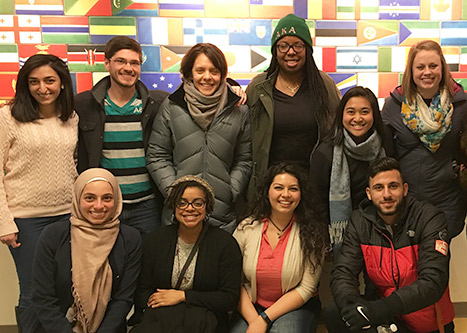Interreligious Student Experiences
There are a variety of opportunities for Marquette students to experience a culture of encounter and develop friendship through interfaith initiatives.
Immersion experiences
Faith and Nonviolence: Religious Peacebuilding in India
This two-week study abroad program to Delhi and Guwahati, India includes meetings with individuals and organizations working to build sustainable peace at the grassroots level, as well as visits to significant religious, cultural, and historical sites to learn about India's rich history of nonviolent social movements and religious diversity. This study abroad program is listed as THEOI 2500: Theologies of Nonviolence-International.
Engaging Muslims, Countering Islamophobia immersion (Michigan)
This spring break program to Dearborn and Hamtramck, Michigan includes visit to mosques and museums, as well as meetings with scholars, religious leaders, politicians, and community organizers. Participants learn in-depth about Muslim life in America and the experience of being Muslim in the U.S. at this point in history. Learn more about this program and access the application.
Dialogue and action
Culture, Conflict, and Interfaith student group
Culture, Conflict & Interfaith (CCI) is an informal student-led group devoted to discussing topics of cultures and faiths, and where conflict arises within them. In this group, students share their thoughts and experiences in a respectful and engaging environment. Students of all cultures, faiths, and backgrounds are welcome. Follow on instagram @CCImke_
Relational Learning Project
The Center for Peacemaking is a partner of the Relational Learning Project, an initiative started by the Afghan Peace Volunteers and Dr. Hakim Young. The project seeks to nurture learning through relationships with the natural world and the human family. We invite Marquette students and community members to join a Relational Learning Circle and participate in cross-cultural exchange.
Education
THEO 3350: Christian-Muslim Dialogue
This course examines a variety of Christian and Muslim experiences within the context of their engagement with each other. Students read and reflect on official teachings from these religions on their view of a religious "other" as well as the guidelines for inter-religious dialogue developed jointly by members of different faiths.

